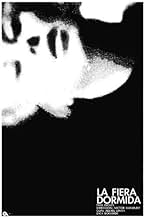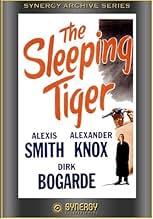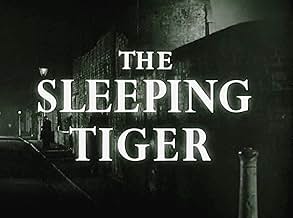NOTE IMDb
6,5/10
1,4 k
MA NOTE
Après avoir cambriolé le domicile d'un psychothérapeute, un criminel accepte de se faire soigner par celui-ci plutôt que d'aller en prison, mais c'était sans compter que la femme du thérapeu... Tout lireAprès avoir cambriolé le domicile d'un psychothérapeute, un criminel accepte de se faire soigner par celui-ci plutôt que d'aller en prison, mais c'était sans compter que la femme du thérapeute tombe amoureuse de lui...Après avoir cambriolé le domicile d'un psychothérapeute, un criminel accepte de se faire soigner par celui-ci plutôt que d'aller en prison, mais c'était sans compter que la femme du thérapeute tombe amoureuse de lui...
- Réalisation
- Scénario
- Casting principal
- Récompenses
- 1 nomination au total
Jimmy Charters
- Jazz Club Patron
- (non crédité)
Martin Lyder
- Jazz Club Patron
- (non crédité)
John Lynn
- Jazz Club Patron
- (non crédité)
Ross Parker
- Barman
- (non crédité)
Jim Tyson
- Jazz Club Patron
- (non crédité)
Harry Van Engel
- Spectator at crash
- (non crédité)
Avis à la une
A more apt title would have been The Sleeping Tigress, for it's Alexis Smith's performance that holds this movie together and lends it erotic friction. Despite her old-money looks and regal carriage, Smith numbered among the many talents which Hollywood mis- and under- used. She claimed attention in two late-forties Bogart vehicles, Conflict (where she was good) and The Two Mrs. Carrolls (in which she was even better, and held her own against Barbara Stanwyck). But most of her movie career consisted of mediocre roles the ones the star actresses turned down or had to refuse owing to other commitments. (It wasn't until Stephen Sondheim's Follies on Broadway in the 70s that her own star shone).
In this film from Joseph Losey's English exile following the Hollywood witch hunt, she plays the bored wife of psychotherapist Alexander Knox (and with him pottering around the house, who wouldn't be bored?). Bleeding-heart Knox takes a troubled young man with a prison record (Dirk Bogarde) under his roof in hopes of performing a therapeutic Pygmalion job on him. At first Smith acts snooty, then grows intrigued, and finally throws herself at Bogarde with pent-up abandon.
Comes the crunch as Knox, in a three-minute Freudian breakthrough reminiscent of Lee J. Cobb's instant rehabilitation of William Holden in The Dark Past, turns the lying, thieving, abusive Bogarde into a contrite milquetoast. When Bogarde then bids her farewell, Smith careens into dementia every bit as swiftly as Bogarde was healed and feigns an assault in hopes that Knox will defend her `honor' with that gun every therapist keeps in his desk drawer....
It's a lame story that might have been more convincing in an American context; the London setting and British conventions (in particular Knox's) stifle it. Bogarde started out playing this sort of charming wrong'un but isn't especially memorable here (except for his towering pompadour that must have been borrowed from Mario Lanza). But Smith's feral feline makes The Sleeping Tiger worth the ticket price.
In this film from Joseph Losey's English exile following the Hollywood witch hunt, she plays the bored wife of psychotherapist Alexander Knox (and with him pottering around the house, who wouldn't be bored?). Bleeding-heart Knox takes a troubled young man with a prison record (Dirk Bogarde) under his roof in hopes of performing a therapeutic Pygmalion job on him. At first Smith acts snooty, then grows intrigued, and finally throws herself at Bogarde with pent-up abandon.
Comes the crunch as Knox, in a three-minute Freudian breakthrough reminiscent of Lee J. Cobb's instant rehabilitation of William Holden in The Dark Past, turns the lying, thieving, abusive Bogarde into a contrite milquetoast. When Bogarde then bids her farewell, Smith careens into dementia every bit as swiftly as Bogarde was healed and feigns an assault in hopes that Knox will defend her `honor' with that gun every therapist keeps in his desk drawer....
It's a lame story that might have been more convincing in an American context; the London setting and British conventions (in particular Knox's) stifle it. Bogarde started out playing this sort of charming wrong'un but isn't especially memorable here (except for his towering pompadour that must have been borrowed from Mario Lanza). But Smith's feral feline makes The Sleeping Tiger worth the ticket price.
Even his staunchest devotees would have to acknowledge that the films of Joseph Losey are notoriously uneven. This one is of interest to Losey completists as it marks his first film in England although sadly, for reasons which have been well documented, both he and adaptors Foreman and Buchman were 'fronted' in the credits.
Losey has done his very best with the melodramatic material at his disposal and has given the film an edginess unusual for the time. There is a palpable sexual tension(surprisingly enough) between the psychotherapist's wife of Alexis Smith and the case for treatment of Dirk Bogarde. It must be said that Bogarde was never really convincing as a heart-throb and here relishes the chance to be menacing. Alexis Smith, cast for the American market, has an extremely challenging role which obliges her to run the gamut and being a thorough professional she surmounts whatever the script throws at her. Her character, like the film itself, goes off the rails at the end but I'm sure that Esso Oil was grateful for the free advertising. Mention must be made of Alexander Knox who navigates the psychobabble and delivers his customarily solid performance.
Whether Losey had a choice of composer for this is debatable but unlike most of his films in which the music is extremely irritating, Malcolm Arnold's powerful score here is spot on and aids the film immeasurably whilst Harry Waxman is a good choice as cinematographer, having previously shot 'Brighton Rock'.
This opus might not have represented the most auspicious start to the Losey/Bogarde collaboration but they could only get better and with the notable exception of 'Modesty Blaise', they most certainly did.
Losey has done his very best with the melodramatic material at his disposal and has given the film an edginess unusual for the time. There is a palpable sexual tension(surprisingly enough) between the psychotherapist's wife of Alexis Smith and the case for treatment of Dirk Bogarde. It must be said that Bogarde was never really convincing as a heart-throb and here relishes the chance to be menacing. Alexis Smith, cast for the American market, has an extremely challenging role which obliges her to run the gamut and being a thorough professional she surmounts whatever the script throws at her. Her character, like the film itself, goes off the rails at the end but I'm sure that Esso Oil was grateful for the free advertising. Mention must be made of Alexander Knox who navigates the psychobabble and delivers his customarily solid performance.
Whether Losey had a choice of composer for this is debatable but unlike most of his films in which the music is extremely irritating, Malcolm Arnold's powerful score here is spot on and aids the film immeasurably whilst Harry Waxman is a good choice as cinematographer, having previously shot 'Brighton Rock'.
This opus might not have represented the most auspicious start to the Losey/Bogarde collaboration but they could only get better and with the notable exception of 'Modesty Blaise', they most certainly did.
Alexis Smith was one of many American stars who came to the United Kingdom to
find work which was becoming less and less in Hollywood as less feature films were being made.. She was lucky to get this role opposite rising British cinema
favorite Dirk Bogarde.
Smith plays the wife of criminal psychologist Alexander Knox who believes that with some analysis some criminals can be cured. So far not different than those two Hollywood classics Blind Alley and The Dark Past. But in those cases criminals broke into the homes of psychologists Ralph Bellamy and Lee J. Cobb and under stress the two mental health professionals did some probing.
But Bogarde is a selected case study. He's paroled to Knox and gets to live in his home where Smith finds the sexy Bogarde impossible to resist.
Bogarde is Stanley Kowalski with a criminal record if this film had been made on this side of the pond Marlon Brando would have been an obvious choice for the part. Let's say that Knox should have kept his business and professional life separate. Smith is great as a forty something woman in some serious heat.
One person I always enjoy seeing in British films is Hugh Griffith who always brings something to even a relatively colorless part like a police inspector here.
Blacklisted director Joseph Losey directed The Sleeping Tiger and it's a fine piece of work
Smith plays the wife of criminal psychologist Alexander Knox who believes that with some analysis some criminals can be cured. So far not different than those two Hollywood classics Blind Alley and The Dark Past. But in those cases criminals broke into the homes of psychologists Ralph Bellamy and Lee J. Cobb and under stress the two mental health professionals did some probing.
But Bogarde is a selected case study. He's paroled to Knox and gets to live in his home where Smith finds the sexy Bogarde impossible to resist.
Bogarde is Stanley Kowalski with a criminal record if this film had been made on this side of the pond Marlon Brando would have been an obvious choice for the part. Let's say that Knox should have kept his business and professional life separate. Smith is great as a forty something woman in some serious heat.
One person I always enjoy seeing in British films is Hugh Griffith who always brings something to even a relatively colorless part like a police inspector here.
Blacklisted director Joseph Losey directed The Sleeping Tiger and it's a fine piece of work
An overdone psychodrama whose twists and turns require some unfortunate stretches.
Too bad the plot ironies finally drown in a tidal wave of over-emotion. Apparently, ace director Losey couldn't tone down Smith's carpet chewing finale that unfortunately overwhelms what's gone before. At the same time, we're hit over the head with the finale's sleeping tiger irony. I think the audience can put two and two together without that billboard contrivance.
Seems Glenda (Smith) is the highly repressed wife of coldly intellectual Dr. Clive (Knox), who's been neglecting her emotional needs as he pursues his writing and research. In that same pursuit he takes proven felon Frank (Bogarde) into his household in order to test his theory of criminal reform. Clive's main reform tool is to excuse Frank's misbehavior whether criminal or moral in order to get at the causes of Frank's disordered psyche. Needless to say, such indulgences cause all kinds of problems, both inside the household and out.
As Doc's indulgences mount, it seems that an optimistic ideal is being mocked. Namely, that there are no bad people, only mistreated kids who then grow into criminal behavior. For example, while in the Doc's "care", Frank robs a jewelry store, and maybe worse, spits on Clive's generosity by seducing wife Glenda. In return, the Doc simply ignores the mounting transgressions. To me, that willingness, which also puts people in Doc's community in danger, looks like a mockery of a liberal brand of Freudianism then in vogue. It may be a provocative idea for the film to play with. Nonetheless, the tiger upshot undercuts that optimism, at the same time it clouds the film's one very real tragedy.
Anyway, Bogarde comes through with a nicely modulated turn, while Knox deadpans through thick and thin, even as Smith does the sleeping tiger to an ear-splitting roar. Apparently the movie was filmed more cheaply abroad at a time when TV was eating into movie profits. So, on a small budget, don't expect much in terms of scenery or action, though noir master Losey does work in some atmosphere. To me, the story's highlight and genuine tragedy is downplayed, but is present nevertheless if you think about it. As the 90-minutes stands, it's something of a disappointment given the talent involved.
(In passing-depending on the camera angle there are times when it appears Frank and Glenda resemble Lucy and Desi from TV's iconic I Love Lucy. Then again, maybe I had one too many beers!)
Too bad the plot ironies finally drown in a tidal wave of over-emotion. Apparently, ace director Losey couldn't tone down Smith's carpet chewing finale that unfortunately overwhelms what's gone before. At the same time, we're hit over the head with the finale's sleeping tiger irony. I think the audience can put two and two together without that billboard contrivance.
Seems Glenda (Smith) is the highly repressed wife of coldly intellectual Dr. Clive (Knox), who's been neglecting her emotional needs as he pursues his writing and research. In that same pursuit he takes proven felon Frank (Bogarde) into his household in order to test his theory of criminal reform. Clive's main reform tool is to excuse Frank's misbehavior whether criminal or moral in order to get at the causes of Frank's disordered psyche. Needless to say, such indulgences cause all kinds of problems, both inside the household and out.
As Doc's indulgences mount, it seems that an optimistic ideal is being mocked. Namely, that there are no bad people, only mistreated kids who then grow into criminal behavior. For example, while in the Doc's "care", Frank robs a jewelry store, and maybe worse, spits on Clive's generosity by seducing wife Glenda. In return, the Doc simply ignores the mounting transgressions. To me, that willingness, which also puts people in Doc's community in danger, looks like a mockery of a liberal brand of Freudianism then in vogue. It may be a provocative idea for the film to play with. Nonetheless, the tiger upshot undercuts that optimism, at the same time it clouds the film's one very real tragedy.
Anyway, Bogarde comes through with a nicely modulated turn, while Knox deadpans through thick and thin, even as Smith does the sleeping tiger to an ear-splitting roar. Apparently the movie was filmed more cheaply abroad at a time when TV was eating into movie profits. So, on a small budget, don't expect much in terms of scenery or action, though noir master Losey does work in some atmosphere. To me, the story's highlight and genuine tragedy is downplayed, but is present nevertheless if you think about it. As the 90-minutes stands, it's something of a disappointment given the talent involved.
(In passing-depending on the camera angle there are times when it appears Frank and Glenda resemble Lucy and Desi from TV's iconic I Love Lucy. Then again, maybe I had one too many beers!)
It's just a bit too much. The good doctor is attacked at gunpoint. He disarms the bad guy, then brings him home to dinner, where his high strung wife spars with the guy. Of course, the two eventually begin a movie long tryst. Dirk Bogarde is a bad boy who is a bundle of anger. He usually gets what he wants but carries more baggage than a porter at an airport. Alexis Smith is the femme fatale. She is older and bored with her psychologist husband, who is determined to resurrect the lad. He is willing to allow this man to do whatever he wants: bringing women to the house, bossing around the help, robbing jewelry stores and businesses. He is pursued by a cop who is on to him but has respect for the doctor and backs off on an arrest. It's hard to believe that this man should give a rip about Bogarde, but somehow he's willing to withdraw. The weakest part of the movie is when it all falls into place. It's so pat. A contemporary film would have built the house a card at a time; this happens in milliseconds. Then we have the denouement which I will not spoil. Let me just say it was a disappointment. The movie is visually sharp and the acting is pretty good. I never really like Alexis Smith much and she is a little grating here. Still, it's a decent performance and the subject is a little ahead of its time.
Le saviez-vous
- AnecdotesWhen this movie first appeared, the direction was credited to Victor Hanbury, a real-life Producer, who only agreed to take the credit when the actual Director, the blacklisted Joseph Losey, insisted that this would be a great help to him, as he needed the work. Although several versions of this movie, including the DVD, still credit Hanbury, there are prints where Losey is credited under his own name. The first several times it was shown on British television, in the late 1960s and early 1970s, Losey had the credit.
- GaffesAngry that Frank has left her Glenda wearing a black dress runs from the house, jumps in her car and drives off. Spotting Frank (Dirk Bogarde) walking along the road she stops and picks him up but she's now wearing a coat.
- Citations
Glenda Esmond: You're not going to give me notice, like a servant or a waitress!
- ConnexionsFeatured in Joseph Losey: The Man with Four Names (1998)
Meilleurs choix
Connectez-vous pour évaluer et suivre la liste de favoris afin de recevoir des recommandations personnalisées
- How long is The Sleeping Tiger?Alimenté par Alexa
Détails
- Date de sortie
- Pays d’origine
- Langue
- Aussi connu sous le nom de
- The Sleeping Tiger
- Lieux de tournage
- William Mansell, 24 Connaught Street, Londres, Angleterre, Royaume-Uni(Smash & Grab 27 minutes from start)
- Sociétés de production
- Voir plus de crédits d'entreprise sur IMDbPro
- Durée1 heure 29 minutes
- Couleur
- Rapport de forme
- 1.37 : 1
Contribuer à cette page
Suggérer une modification ou ajouter du contenu manquant

Lacune principale
By what name was La bête s'éveille (1954) officially released in India in English?
Répondre




























